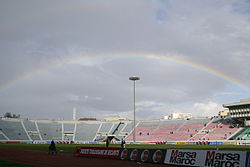| Athletics at the I Jeux de la Francophonie | |
|---|---|
 | |
| Dates | 12–17 July 1989 |
| Host city | Casablanca, Morocco |
| Venue | Stade Mohammed V |
| Events | 41 |
At the 1989 Jeux de la Francophonie , the athletics events were held in Casablanca, Morocco from 12 to 17 July.
| Athletics at the I Jeux de la Francophonie | |
|---|---|
 | |
| Dates | 12–17 July 1989 |
| Host city | Casablanca, Morocco |
| Venue | Stade Mohammed V |
| Events | 41 |
At the 1989 Jeux de la Francophonie , the athletics events were held in Casablanca, Morocco from 12 to 17 July.
* Host nation (Morocco)
| Rank | Nation | Gold | Silver | Bronze | Total |
|---|---|---|---|---|---|
| 1 | 20 | 21 | 17 | 58 | |
| 2 | 8 | 11 | 9 | 28 | |
| 3 | 6 | 5 | 3 | 14 | |
| 4 | 3 | 0 | 3 | 6 | |
| 5 | 1 | 1 | 1 | 3 | |
| 1 | 1 | 1 | 3 | ||
| 7 | 1 | 1 | 0 | 2 | |
| 8 | 1 | 0 | 3 | 4 | |
| 9 | | 0 | 1 | 0 | 1 |
| 10 | 0 | 0 | 2 | 2 | |
| 0 | 0 | 2 | 2 | ||
| 12 | 0 | 0 | 1 | 1 | |
| Totals (12 entries) | 41 | 41 | 42 | 124 | |